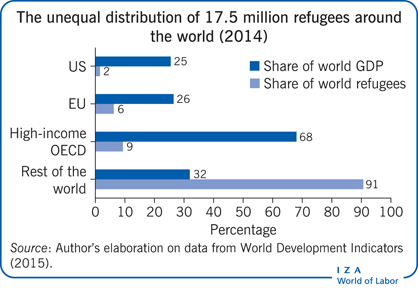Elevator pitch
The unequal distribution of refugees across countries could unravel the international refugee protection system or, in the case of the EU, hinder a common policy response to refugee crises. A way to distribute refugees efficiently, while respecting their rights, is to combine two market mechanisms. First, a market for tradable refugee admission quotas that allows refugees to be established wherever it is less costly to do so. Second, a matching system that links refugees to their preferred destinations, and host countries to their preferred types of refugees. The proposal is efficient but has yet to be tested in practice.

Key findings
Pros
A market for tradable quotas coordinates countries receiving refugees.
Tradable quotas minimize the total cost of hosting refugees, as “refugee-friendly” countries are paid by “refugee-unfriendly” ones for the numbers they host in excess of their quota.
A matching mechanism ensures that refugee rights are respected and that refugees can express their preferences.
The initial distribution of refugees becomes more flexible under this proposal.
The economic component, i.e. the tradable quotas market, is combined with the humanitarian one, i.e. matching, favoring political feasibility.
Cons
The proposal is theoretical and has not yet been implemented in practice.
Participating countries would face some uncertainty about the final allocation of refugees.
Allowing refugees to choose their destinations can be unpopular with some receiving countries’ constituencies.
The system minimizes total costs but some countries may lose if the initial distribution rules are not adjusted properly.
Political feasibility depends on making the system transparent both for refugees and host countries.